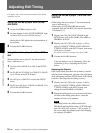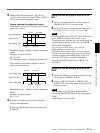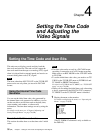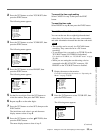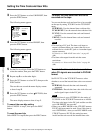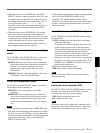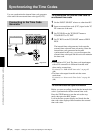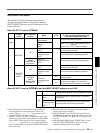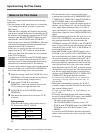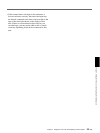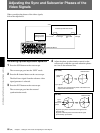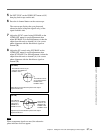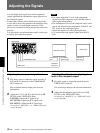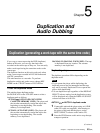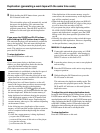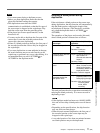
Synchronizing the Time Codes
Chapter 4 Setting the Time Code and Adjusting the Video Signals
64 (GB) Chapter 4 Setting the Time Code and Adjusting the Video Signals
Notes on the Time Codes
Time codes output from the unit have the following
restrictions:
• The unit outputs an EE signal when it is in recording
or recording pause modes, or when you press the
REC button.
While the unit is outputing an EE signal, only the time
code from an external device that is connected to the TC
IN connector will be through-output from the TC OUT
connector when the INPUT SELECT selector is set to
other than DV, and TC/UB IN on the TC/UB SET
menu has been set to other than INTERNAL. (The time
code and user bits that are internally generated are not
output from the TC OUT connector.)
In this case, as a result, the time code will not be
output from the TC OUT connector when the time
code is not input from the external device connected
to the TC IN connector.
You need to set TC/UB IN on the TC/UB SET menu to
INTERNAL to output a time code from the TC OUT
connector even if no time code has been input from an
external device connected to the TC IN connector.
To set the unit to inherit a time code from the external
device even after you set TC/UB IN to INTERNAL
from some other setting, follow the steps below.
1 Match the settings (used when TC/UB IN is set to
INTERNAL) of the unit with the external device
format. (See the setting example below.)
2 After setting TC/UB IN to other than
INTERNAL, connect the external device to the
TC IN connector to input the time code.
3 Set TC/UB IN on the TC/UB SET menu to
INTERNAL.
4 Disconnect the external device from the TC IN
connector.
Setting example
If the time code setting of the external device is
TC: Drop frame; UB: 12 34 56 78.
This unit’s menu Setting
TC RUN FREE RUN
TC FORMAT DF
UB PRESET 12 34 56 78
(The TC FORMAT submenu is only for the DSR-
45.)
• The internal time code is output with the phase
synchronized to the line-outs (COMPONENT OUT,
S VIDEO OUT, VIDEO OUT) when TC/UB IN on
the TC/UB SET menu is set to INTERNAL.
(When the EE signal is output, the output signals of
the line-outs are delayed for one line from the input
video signal when component video or S-video is
input, and delayed for two lines from the input video
signal when composite video (VIDEO IN REF.IN) is
input.)
• When inputting signals from the DV jack, if you set
DV IN TC to INTERNAL, the time code and user
bits generated internally are recorded under the
INTERNAL setting in TC/UB IN on the TC/UB SET
menu. If you want to record with the time code input
from the DV jack, set DV IN TC to EXTERNAL or
use the duplicate function.
• When REC MODE on the VTR SET menu is set to
DVCAM, if you set DV IN TC to EXTERNAL, this
unit records the time code input via the DV jack and
the user bits internally generated, and the TC OUT
connector outputs the same time code and user bits.
• During the duplicate operation, this unit records the
time code and user bits on the source tape currently
being duplicated and the TC OUT connector outputs
the same time code and user bits. The time code and
user bits are output with the phase synchronized to
the line-outs (COMPONENT OUT, S VIDEO OUT,
VIDEO OUT) during the duplicate operation.
For details on the duplicate function, see “Duplication
(generating a work tape with the same time code)” on
page 69 (GB).
• During the audio dubbing operation, the TC OUT
connector outputs the time code and user bits on the
tape currently being played.
For details on audio dubbing, see “Audio Dubbing” on
page 74 (GB).
• To display and check the time code currently being
advanced with the FREE RUN setting, press the REC
button when all the conditions below are met.
– The unit is in the stop mode.
– The COUNTER SELECT selector is set to TC.
– TC RUN on the TC/UB SET menu is set to FREE RUN.
– TC MAKE on the TC/UB SET menu is set to
PRESET.
If you press the STOP button, the time code display
returns to the last time code value it was able to read
on the tape.



